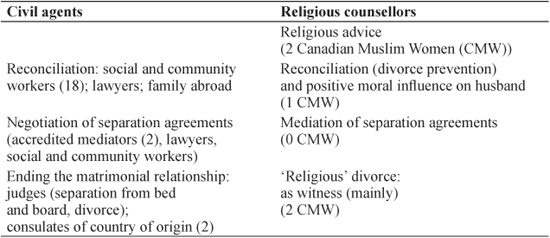Canadian Muslim Women and Resolution of Family Conflicts: An Empirical Qualitative Study (2005–2007)

Chapter 27
Canadian Muslim Women and Resolution of Family Conflicts: An Empirical Qualitative Study (2005–2007)
This chapter is based on data collected from a qualitative research project conducted between 2005 and 2007. The project was born in the context of the debates in Canada surrounding religious arbitration of family disputes. While in the province of Ontario faith-based arbitration was recognized by the state until 2005,1 in the province of Quebec arbitration of family disputes was prohibited in general (art. 2639 al. 1 of the Quebec Civil Code: ‘Disputes over the status and capacity of persons, family matters or other matters of public order may not be submitted to arbitration’).
At that time, to our knowledge, no research had yet been undertaken to explore the reality on the ground, particularly within the Muslim communities, even though alternate dispute resolution is documented as an important part of the informal legal landscape in Western societies such as Great Britain, the United States and Canada.2 For instance, in Great Britain, ‘Shari’a courts can pass arbitration awards through the use of the Arbitration Act of 1996 and some research has addressed this phenomenon although not its actual process.3
This chapter focuses on two interrelated questions that were at the centre of this research:
1. Does there exist in the Montreal Muslim communities a parallel justice system for the resolution of family disputes?
2. To what degree are the Quebec civil justice system and Muslim dispute resolution processes insular or, on the contrary, overlapping?
In its last section, the chapter examines the way the debate has been framed around faith-based arbitration.
Functions of Agents in Family Disputes According to Women and Religious Counsellors
Many women sought out the help of a number of different agents, but for different reasons. For example, amongst the 18 (of 24) women interviewed who had experienced family conflict, five consulted with both a religious counsellor and a lawyer, while one woman consulted solely with a religious counsellor.4 Amongst the women interviewed, most had used the services of a social worker or community worker and some had consulted lawyers, mainly from legal aid clinics.5 None of them had seen an accredited family mediator. Two reasons would appear to account for this: on the one hand accredited mediators did not speak their mother tongue or come from their ethno-cultural community, and on the other hand other women wrongly associated accredited mediation with the informal mediations they experienced with religious counsellors, social workers or community workers and therefore did not see the use of it. Also, one woman had been divorced in Tunisia (her father represented her) and another one had been in contact with the Algerian consulate in Canada in order to divorce.
Dissimilarity of Functions with Some Rare Overlap between Civil Agents and Religious Counsellors
The functions attributed to civil and religious agents by the women respondents are presented in Table 27.1.
It is worth noting that there exists a correlation between frequenting mosques and consulting a religious counsellor since five out of the six women who consulted an imam say they have a more ‘integral’ relationship to religion. However the fact that the majority of the religious counsellors characterize their clientele as essentially ‘less practising’ Muslims, rarely seen in mosques, leads one to think that ‘selective and discrete’ Muslims also have recourse to them.6
Table 27.1 Function attributed by women respondents

Regarding recourse to the official legal system,7 it appears that a number of Muslim women were not intending to use the Quebec tribunals but were ‘pushed’ to do so. For instance, a legal aid lawyer we interviewed mentioned that a substantial number of their Muslim clientele were referred to them by the social welfare organizations. Indeed in Quebec, social solidarity (social welfare) only intervenes when family solidarity does not exist or does not work. Hence a married or divorced woman who requests social welfare needs to prove that her husband or ex-husband is unable to pay her any alimony and therefore will need to go in court to exercise her right to alimony. Another avenue by which Muslim women are directed towards the tribunal is through cases of domestic violence. In those cases, social services will strongly push women to end their marriage.
The religious counsellors confirm what the women participants assert as to their main functions of advisor and conciliator. A minority (six out of 13) add mediation of separation agreements, which represents 2 per cent to 30 per cent of their cases and deals with: mahr, child custody, alimony, division of family assets.
‘Adjudication’?
Religious counsellors presented themselves as the advisors to both spouses or as a neutral party. When they play the role of mediator in the context of divorce agreements, a few religious counsellors mention that they sometimes give a decision or shift their role to that of arbitrator when the parties cannot come to an agreement on their own. However, the result is never considered obligatory or final by either the counsellor or the parties, and the mutual consent of the parties must always be obtained regarding the content of the agreement itself (which can be oral or written). Thus neither the religious counsellor nor the parties recognize in the counsellor an adjudicatory authority that can replace the state judge.
Furthermore most of the religious counsellors admit openly that clients (including women) ‘shop for’ the solution most advantageous to themselves by comparing the opinions of different imams. In addition, some religious counsellors mentioned that many Muslim women know their rights under Quebec law and that on several occasions women referred to and argued on the basis of Quebec law in negotiations with their husbands.